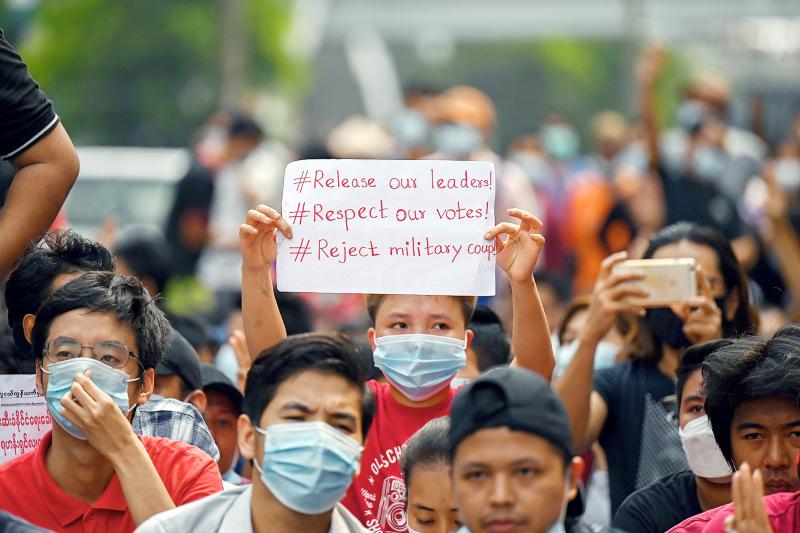Myanmar yesterday saw its largest anti-coup protests yet, with young demonstrators spilling on to the streets to denounce the country’s new military regime, despite a nationwide Internet blackout aimed at stifling a growing chorus of popular dissent.
Soon before nearly all lines of communication in and out of the country went dark, an Australian adviser to ousted Burmese state counsellor Aung San Suu Kyi told media he had been detained and was unable to leave his hotel.
The shutdown did not stop several thousand demonstrators from gathering on a road near the University of Yangon, many holding up the three-finger salute that has come to symbolize resistance to the army takeover.

Photo: AFP
“Down with the military dictatorship,” the crowd yelled, many donning red headbands — the color associated with Aung San Suu Kyi’s National League for Democracy party.
A large riot police contingent blocked nearby roads, with two water cannon trucks parked at the scene.
Some protesters left the area without confrontation, while others remained at the scene, with no reports of clashes with police so far.
At least two other groups of demonstrators were marching through other parts of Myanmar’s biggest city, while as many as 2,000 people were marching further north in Mandalay, Agence France-Presse reporters on the ground said.
All were out to condemn Monday’s raids that brought a sudden halt to the country’s brief 10-year experiment with democracy, just as lawmakers elected in national polls in November last year were due to sit in parliament for the first time.
“They don’t respect our people’s votes, and I think they are betraying the country,” one protester said. “Our revolution starts today.”
Australian professor Sean Turnell became the latest figure associated with Aung San Suu Kyi — and the first confirmed foreign national — to be detained by the junta.
“I’m just being detained at the moment, and perhaps charged with something. I don’t know what that would be,” Turnell, a longtime economics adviser to the Nobel laureate, told the BBC.
Online calls to protest the army takeover had prompted increasingly bold displays of defiance against the regime, including the nightly deafening clamor of people around the country banging pots and pans — a practice traditionally associated with driving out evil.
Some have shown their opposition by gathering for group photographs with banners decrying the coup and flashing a three-finger salute earlier adopted by democracy protesters in neighboring Thailand.

The Ministry of the Interior (MOI) is to tighten rules for candidates running for public office, requiring them to declare that they do not hold a Chinese household registration or passport, and that they possess no other foreign citizenship. The requirement was set out in a draft amendment to the Enforcement Rules of the Public Officials Election and Recall Act (公職人員選舉罷免法 ) released by the ministry on Thursday. Under the proposal, candidates would need to make the declaration when submitting their registration forms, which would be published in the official election bulletin. The move follows the removal of several elected officials who were

The Republic of China (ROC) is celebrating its 114th Double Ten National Day today, featuring military parades and a variety of performances and speeches in front of the Presidential Office in Taipei. The Taiwan Taiko Association opened the celebrations with a 100-drummer performance, including young percussionists. As per tradition, an air force Mirage 2000 fighter jet flew over the Presidential Office as a part of the performance. The Honor Guards of the ROC and its marching band also heralded in a military parade. Students from Taichung's Shin Min High School then followed with a colorful performance using floral imagery to represent Taiwan's alternate name

FOUR DESIGNATED AREAS: Notices were issued for live-fire exercises in waters south and northwest of Penghu, northeast of Keelung and west of Kaohsiung, they said The military is planning three major annual exercises across the army, navy and air force this month, with the navy’s “Hai Chiang” (海強, “Sea Strong”) drills running from today through Thursday, the Ministry of National Defense said yesterday. The Hai Chiang exercise, which is to take place in waters surrounding Taiwan, would feature P-3C Orion maritime patrol aircraft and S-70C anti-submarine helicopters, the ministry said, adding that the drills aim to bolster the nation’s offshore defensive capabilities. China has intensified military and psychological pressure against Taiwan, repeatedly sending warplanes and vessels into areas near the nation’s air defense identification zone and across

A Chinese takeover of Taiwan would severely threaten the national security of the US, Japan, the Philippines and other nations, while global economic losses could reach US$10 trillion, National Security Council Deputy Secretary-General Lin Fei-fan (林飛帆) wrote in an article published yesterday in Foreign Affairs. “The future of Taiwan is not merely a regional concern; it is a test of whether the international order can withstand the pressure of authoritarian expansionism,” Lin wrote in the article titled “Taiwan’s Plan for Peace Through Strength — How Investments in Resilience Can Deter Beijing.” Chinese President Xi Jinping’s (習近平) intent to take Taiwan by force